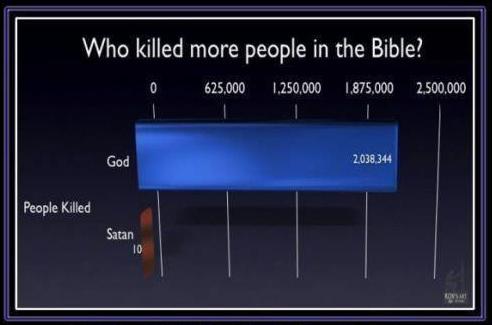The reason that God appears so violent in Scripture (and in nature) is not because He is violent, but because He allows human and natural violence to be attributed to His name for our own sake. There are numerous reasons God allows violence to be attributed to His name, but we must begin by understanding the origin of violence itself.
The Origin of Violence
 Throughout history and around the world, people have noticed that violence permeates everything. From birth to death, from galaxies down to sub-atomic particles, violence is omnipresent. Whenever people recognize this, they are left with only two basic options for the existence and origin of violence.
Throughout history and around the world, people have noticed that violence permeates everything. From birth to death, from galaxies down to sub-atomic particles, violence is omnipresent. Whenever people recognize this, they are left with only two basic options for the existence and origin of violence.
First, as I discuss in my book, (#AmazonAdLink) The Atonement of God, some people decided that violence and evil were eternal and that God was constantly at war against this violence and evil, but would never overcome it. This view has come to be known as dualism, and while dualism is prevalent in many Eastern religions and has attached itself in various ways to most Western religions (including Christianity), most Christians would not say that evil is eternally co-existent with God.
The second option for the origin of violence is that somehow or another, violence and evil originated with God (or the gods). Though many in the ancient world had no problems with such an idea (just look at how the gods of Egyptian, Persian, Greek, Roman, and Egyptian mythology behave) such a suggestion is not acceptable to most people today. Ever since the time of Plato (and as a result of his ideas), the gods are supposed to behave in morally superior manner, and not simply be extreme manifestations of humanity’s deepest emotions and desires.
God and the Origin of Violence
Since neither option for the origin of evil and violence appeals to most Christians, numerous theories have been proposed for how violence and evil can exist in God’s good creation while not being eternally existent with God nor having its origin in God.
Some say the violence came directly from God, while others said its origin was in evil spiritual beings who rebelled against God, or even in mankind ourselves, but such options beg the question about why God would create beings who were capable of such evil.
Others argue that violence and evil are not always identical, so that what is violent may not always be evil. Though this is true, the origin of violence and evil must still be considered.
Regardless of which view people today hold regarding the origin of evil and violence, it cannot be denied that civilizations of earlier eras believed that since all creation was violent, and since all creation came from God, that therefore, God also was violent. How else, they thought, could violence exist? If God did not will it, want it, or command it, violence would have no place in the world.
Such a view is not surprising, for many people today believe the exact same thing.
The Origin of our OWN Violence
But more than the origin of violence, people needed an object on which to blame their own violence. For while everybody hates violence in others, we always seek to justify the violence that we ourselves exhibit.
Whenever we ourselves commit violence, we almost always find some way to blame it as a necessary response to the actions of others against us. Sometimes, when our violence has no one else to blame, we place blame upon God.

If we deny that God is the source of our violence, then we are left with only two options: either we must call our violence “good” or we must accept that we ourselves are terribly and inherently violent.
Though some theologians take the first option and some warriors take the second, the vast majority of mankind prefers to blame their violence on God. The violent God of a violent creation is the perfect target for our own violence. The word “target” is used intentionally. When we blame God for the violence we ourselves commit, God becomes both the justification for our violence, and the victim of it.
So why does God appear violent in Scripture? Because we have blamed God for our own violence. (See my book, (#AmazonAdLink) The Atonement of God, for a longer explanation.)
God appears violent in the Bible because humans would rather blame God for our violence than admit that we ourselves are violent. And as we have seen in previous posts, and will see in future posts, God willingly accepts the blame (or responsibility) for our violence because He is seeking to rescue and deliver us from it.
 How can a God who says "Love your enemies" (Matthew 5:44) be the same God who instructs His people in the Old Testament to kill their enemies?
How can a God who says "Love your enemies" (Matthew 5:44) be the same God who instructs His people in the Old Testament to kill their enemies?
These are the sorts of questions we discuss and (try to) answer in my online discipleship group. Members of the group can also take ALL of my online courses (Valued at over $1000) at no charge. Learn more here: Join the RedeemingGod.com Discipleship Group I can't wait to hear what you have to say, and how we can help you better understand God and learn to live like Him in this world!




 This was the lie of the serpent to Eve when the serpent asked her why God would put a tree in the garden from which she could not eat, or even touch. Aside from misquoting what God had said and raising doubt in Eve’s mind about the Word of God, the serpent was implying that whatever Eve did about the fruit, it was God’s fault for putting the tree there in the first place.
This was the lie of the serpent to Eve when the serpent asked her why God would put a tree in the garden from which she could not eat, or even touch. Aside from misquoting what God had said and raising doubt in Eve’s mind about the Word of God, the serpent was implying that whatever Eve did about the fruit, it was God’s fault for putting the tree there in the first place. This blame game is something we learned from the devil since the very first human sin. The devil carries out the murders and lies about it, and as subjects to the god of this world, we follow in Adam’s footsteps and learn to blame God as well for the evil we do. Jesus shows this in numerous places in the Gospels, but one of the clearest is in John 8:44 where Jesus explains that the devil “was a murderer from the beginning, not holding to the truth, for there is no truth in him … he is a liar and the father of lies” (NIV).
This blame game is something we learned from the devil since the very first human sin. The devil carries out the murders and lies about it, and as subjects to the god of this world, we follow in Adam’s footsteps and learn to blame God as well for the evil we do. Jesus shows this in numerous places in the Gospels, but one of the clearest is in John 8:44 where Jesus explains that the devil “was a murderer from the beginning, not holding to the truth, for there is no truth in him … he is a liar and the father of lies” (NIV).
 In the New Testament, the Greek word telos is often translated “end,” but it could also be translated as “goal, purpose, or culmination.” So while the word can refer to the end of something chronologically, as in “then the end will come” (e.g., Matt 24:6, 14), it can also refer to the goal, purpose, or outcome of a series of events (cf. Rom 6:21-22).
In the New Testament, the Greek word telos is often translated “end,” but it could also be translated as “goal, purpose, or culmination.” So while the word can refer to the end of something chronologically, as in “then the end will come” (e.g., Matt 24:6, 14), it can also refer to the goal, purpose, or outcome of a series of events (cf. Rom 6:21-22). This does not mean that Jesus was going to sin or become a sinner, but that it was necessary for Him to identify with us in our sin. His goal was to be counted among the lawless, the godless, and the transgressors. One translation of Luke 22:37 even states that Jesus’ goal was “let himself be taken for a criminal” (JB).
This does not mean that Jesus was going to sin or become a sinner, but that it was necessary for Him to identify with us in our sin. His goal was to be counted among the lawless, the godless, and the transgressors. One translation of Luke 22:37 even states that Jesus’ goal was “let himself be taken for a criminal” (JB).

 At times God appears violent, not because He is violent, but because, just as Jesus on the cross took the sin of the world upon Himself, so also God in human history, took the violence of humanity upon Himself.
At times God appears violent, not because He is violent, but because, just as Jesus on the cross took the sin of the world upon Himself, so also God in human history, took the violence of humanity upon Himself.


 I am teaching my daughters math, and while I know Calculus, I cannot attempt to teach them everything I know about math on day one, from basic arithmetic all the way to calculus. Not only is there not enough time to do this, they would not comprehend most of it, but would instead get overwhelmed and as a result, would not even understand the most basic concepts in math.
I am teaching my daughters math, and while I know Calculus, I cannot attempt to teach them everything I know about math on day one, from basic arithmetic all the way to calculus. Not only is there not enough time to do this, they would not comprehend most of it, but would instead get overwhelmed and as a result, would not even understand the most basic concepts in math.